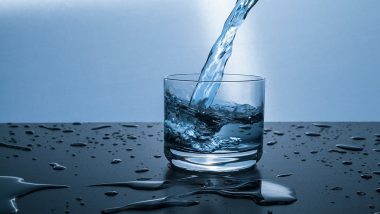New Delhi, August 4: Indian researchers have come up with an innovative hydrogen manufacturing route which increases its production three times and lowers the energy required that could pave the path towards environment-friendly hydrogen fuel at a lower cost. As a fuel, hydrogen has a critical role to play in driving the paradigm shift towards a green and sustainable economy. In addition to having about three-fold higher calorific value compared to non-renewable energy sources such as coal and gasoline, the combustion of hydrogen to release energy produces water and is thus completely non-polluting.
Due to the extremely low abundance of molecular hydrogen in the earth's atmosphere (350 ppbv), electric-field driven breakdown of water is an attractive route for production of hydrogen. Indian-Origin Scientist in US Develop Novel System That Can Extract Oxygen, Fuel From Salty Water on Mars.
However, such electrolysis requires high energy input and is associated with slow rate of hydrogen production. The use of expensive platinum and iridium-based catalysts also discourages it for wide-spread commercialisation. Therefore, the transition to 'green-hydrogen-economy' demands approaches that lower the energy and material costs and simultaneously improve the hydrogen production rate, said a release from the Department of Science and Technology (DST) under the Ministry of Science and Technology.
A team of researchers from IIT Bombay, led by C. Subramaniam, have come up with an innovative route that provides viable solutions to all these challenges. It involves electrolysis of water in the presence of an external magnetic field.
In this method, the same system that produces 1 ml of hydrogen gas required 19 pr cent lower energy to produce 3 ml of hydrogen in the same time. This is achieved by synergistically coupling the electric and magnetic fields at the catalytic site, the scientists explained.
The simple approach also provides the capability to retrofit any existing electrolyser (that uses electricity to break water into hydrogen and oxygen) with external magnets without drastic change in the design, leading to increased energy efficiency of H2 production. This proof-of-concept demonstration for producing hydrogen has been published in the journal ACS Sustainable Chemistry & Engineering.
The electrocatalytic material -- cobalt-oxide nano-cubes that are dispersed over hard-carbon based nanostructured carbon florets -- is of prime importance to achieve this effect and was developed with the support of a grant from the Department of Science & Technology's Material for Energy Storage Programme in the Technology Mission Division.
"The intermittent use of an external magnetic field provides a new direction for achieving energy-efficient hydrogen generation. Other catalysts can also be explored for this purpose," Subramaniam said.
"A basic electrolyser cell of 0.5 nm3/h capacity can be immediately upgraded to a 1.5 nm3/h capacity by replacing the catalysts and supplying the magnetic field," added Jayeeta Saha and Ranadeb Ball, both students supported by the DST funding.
Having shown that the method is not very complicated either, the team is now working with an industrial partner to increase the TRL level and ensure its successful commercialisation.
"Given the importance of hydrogen-based economy, we aim to implement the project in a mission-mode and realise an indigenous magneto-electrolytic hydrogen generator," said Subramaniam, adding: "If their efforts are successful, we might be looking at an environmentally friendly fuel, hydrogen, replacing petroleum, diesel, and compressed natural gas (CNG) in the future."
(The above story first appeared on LatestLY on Aug 04, 2021 08:13 PM IST. For more news and updates on politics, world, sports, entertainment and lifestyle, log on to our website latestly.com).













 Quickly
Quickly


